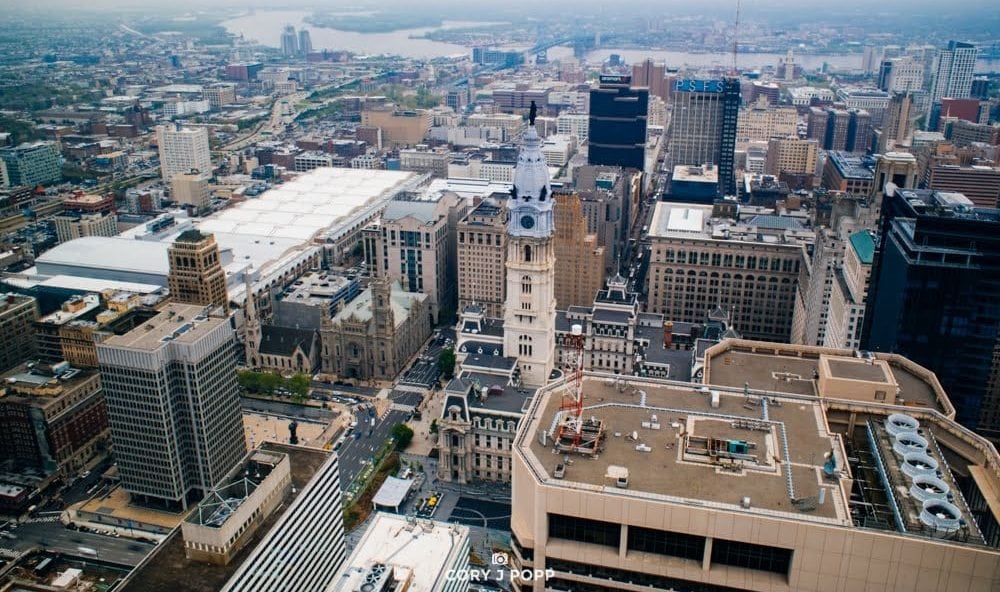
This editorial article is a part of Racial Equity in Tech Month of Technical.ly's editorial calendar. This month’s theme is underwritten by Verizon 5G. This story was independently reported and not reviewed by Verizon before publication.
In alignment with Juneteenth 2021, a collection of equity-focused organizations across the country launched the Inclusive Capital Collective (ICC) this week to take aim at systemic racism and build community wealth. A newly formed org out of Philadelphia is one of them.
The collective is made up of a growing network of community fund managers and entrepreneurial support organizations that share a goal of deploying financial capital and other resources to entrepreneurs and communities of color. The launch’s timing also honors the 100th anniversary of the Tulsa Race Massacre, when white residents of Tulsa, Oklahoma attacked and burned down more than 35 square blocks of the Greenwood District of the city — at the the time, the wealthiest Black community in the U.S., known as “Black Wall Street.”
One of the ICC’s first actions was to release the first in a series of Black Papers, or briefings that outline the systemic barriers in financial markets. There’s a focus on areas that are ripe for interventions by investors who are interested in deploying their resources for social justice.
The first Black Paper focuses on the shifting power and capital in the real estate and finance industries for people of color. It focuses here first, the org said, because real estate is the largest source of asset-based wealth and opportunity for American families, but Black and other communities of color are systematically marginalized in renting, owning and financing real estate. Consider the legacy of redlining.
Read the paperThe Philly-based Black Squirrel Collective (BSC) is a partner of this ICC effort. BSC aims to connect underserved communities to the resources to sustain a thriving, community-based economy, including by providing small business owners pathways to capital.
BSC was formed early this year by Kevin Williams, an entrepreneur and the CEO of the SMART Group; James Burnett, executive director of VestedIn (formerly the West Philadelphia Financial Services Institution); Thom Webster, an entrepreneur and advisor to University City Science Center startups; and Jabari Jones, president of the West Philadelphia Corridor Collaborative.
Williams said that in all of the research about how Philadelphia is the country’s poorest big city and the attention that’s been drawn to the plight of minorities over the past year, he and his fellow cofounders didn’t see the change they’d wanted to.
“We know Black people are poor, but what is the follow up?” he said Wednesday morning. “There’s hardly a way to show. We need to be vocal [and] continue to drive the point that equity has to occur, whether through access to capital of real estate, reparations or something in between.”
The first Black Paper highlights a case study on Philly Rise, BSC’s real estate accelerator for Black developers. The accelerator aims to provide this group a source of patient equity and debt capital, technical assistance, and public and private partnerships to empower developers to acquire and develop publicly held and vacant properties in the city. In turn, it increases opportunities for Black developers to provide affordable housing and retail, and builds community wealth.
Only about 4% of new development happening in the U.S. is being done by people of color, Williams said. Meanwhile, the City of Philadelphia currently has more than 42,000 vacant land parcels. Williams said the BSC leaned on the Pew Foundation and the Federal Reserve Bank of Philadelphia to understand the scope of financial inequity in Philadelphia.
“The whole city is going through a redevelopment phase. White developers getting richer and the Black people who have to rent and buy from them are getting poorer,” he said. “As the majority population in the city, it should be more equitable. ICC let me know this wasn’t just happening in Philadelphia.”
By joining ICC, the Black Squirrel Collective has been able to collaborate and share ideas with the other orgs involved, like Chicago TREND and The Guild in Atlanta. Williams said he was motivated by hearing the stories of cities like Portland and Oakland, California, which are “actively changing the landscape.”
The ICC’s call to action includes shifting the narrative about the role of capital in communities and reframing the perceptions of risk involved. It will also work to make policy change at local, state and federal levels to support entrepreneurs and real estate developers of color, and mobilize $100 million in capital within historically disenfranchised communities across the U.S. It will also continue to connect and amplify community fund managers so that they can access institutional capital and bring them resources.
Join the conversation!
Find news, events, jobs and people who share your interests on Technical.ly's open community Slack

Philly daily roundup: East Market coworking; Temple's $2.5M engineering donation; WITS spring summit

Philly daily roundup: Jason Bannon leaves Ben Franklin; $26M for narcolepsy treatment; Philly Tech Calendar turns one

Philly daily roundup: Closed hospital into tech hub; Pew State of the City; PHL Open for Business


